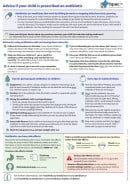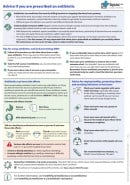You can now add Healthify as a preferred source on Google. Click here to see us when you search Google.
Clindamycin
Sounds like 'klin-da-my-sin'
Key points about clindamycin
- Clindamycin is an antibiotic used to treat infections caused by bacteria.
- Clindamycin is also called Dalacin-C® or Topicil®.
- Find out how to take it safely and possible side effects.

Clindamycin is an antibiotic used to treat different infections caused by bacteria. Examples of infections clindamycin may be used to treat include skin infections or tooth infections where other antibiotics haven't worked.
Clindamycin works by killing or stopping the growth of bacteria (bugs) and getting rid of the infection. Like all antibiotics, it's not effective against infections caused by viruses.
In Aotearoa New Zealand clindamycin is available as capsules (150mg) and can be given as an injection in the hospital.
- Always take clindamycin exactly as your doctor has told you. The pharmacy label on your medicine will tell you how much to take, how often to take it and any special instructions.
- The dose of clindamycin will depend on the type of infection you have and your body weight.
- Your doctor will advise you on how long to take clindamycin for.
- For most infections, you should feel better within a few days.
- Timing of your doses: You can take clindamycin capsules with or without food. Swallow the capsules with a large glass of water. Don't chew them. Stay upright for at least 30 minutes after taking a dose. Try to space the doses evenly throughout the day. If you take it 3 times a day, this could be first thing in the morning, mid-afternoon and at bedtime. Ideally these times should be at least 4 hours apart.
- Missed dose: If you forget to take your dose, take it as soon as you remember. But if it is nearly time for your next dose, take the next dose at the right time. Don't take extra doses to make up for a forgotten dose. If you're not sure what to do, ask your healthcare provider.
- Finish the course: Take the whole course of antibiotics for the number of days your doctor has told you to. Don't stop taking it, even if you feel better. If you stop your treatment early, your infection could come back.
- Clindamycin may interact with some medicines, herbal supplements and rongoā Māori, so check with your doctor or pharmacist before starting any new products and let your doctor know about all the medicines and supplements you are taking.
- It's important to tell your doctor if you have diarrhoea (runny poo) during or after treatment with clindamycin. Do this even if it occurs several weeks after clindamycin has been stopped. Diarrhoea may be caused by a serious condition affecting your bowel and you may need urgent medical care.
- Clindamycin can cause dizziness in some people, so be careful driving or operating machinery until you know how this medicine affects you.
- If you're taking the contraceptive pill, you don't usually need to use additional contraception if you're taking clindamycin. But if you have diarrhoea (runny poo/hamuti) or vomiting (being sick), lasting more than 24 hours, absorption of the contraceptive pill may be affected. If this happens, ask your doctor or pharmacist for advice about contraception over the following few days.
- Pregnancy: Contact your doctor immediately if you become pregnant.
Like all medicines, clindamycin can cause side effects, although not everyone gets them. If you're concerned about any symptoms you think might be related to your medicine, talk to your healthcare provider. The following information offers some guidance but doesn't include all possible side effects.
Common side effects
Tell your healthcare provider if these side effects bother you.
- Sore tummy.
- Painful throat or trouble swallowing: Swallow the capsules with a large glass of water. Don't chew them. Stay upright for at least 30 minutes after taking a dose.
- Change in taste.
Tell your healthcare provider immediately or phone Healthline free on 0800 611 116 if these occur
- Ongoing diarrhoea (runny poo): It's important to tell your healthcare provider if you have ongoing diarrhoea during or after treatment with clindamycin. Tell them even if it occurs several weeks after you've stopped taking clindamycin. Diarrhoea may be caused by a serious condition affecting your bowel and you may need urgent medical care.
- Signs of problems with your blood cells such as mouth ulcers, fever, chills, sore throat, easy or unusual bruising or bleeding, or generally feeling unwell.
- Skin rash.
- Signs of problems with your liver such as yellowing of the eyes and skin, dark urine (pee), stomach pain.
Phone 111 for an ambulance or go to your nearest accident and emergency (A&E) clinic if these occur
- Signs of an allergic reaction such as itchy skin, and rash, swollen lips or tongue, problems breathing, like a tight chest or shortness of breath.
Read more about medicines and side effects and reporting a reaction you think might be a side effect.
The following link provides further information on clindamycin:
Clindamycin(external link) New Zealand Formulary Patient Information
Brochures
Advice if you are prescribed an antibiotic(external link)(external link) BPAC, NZ, 2024
Advice if your child is prescribed an antibiotic(external link)(external link) BPAC, NZ, 2024
Medicines and side effects(external link)(external link) Healthify He Puna Waiora, NZ, 2024
References
- Clindamycin(external link) New Zealand Formulary
Brochures

Advice if your child is prescribed an antibiotic
BPAC, NZ, 2024

Medicines and side effects
Healthify He Puna Waiora, NZ, 2024
Credits: Sandra Ponen, Pharmacist, Healthify He Puna Waiora. Healthify is brought to you by Health Navigator Charitable Trust.
Reviewed by: Angela Lambie, Pharmacist, Auckland
Last reviewed:
Page last updated:






